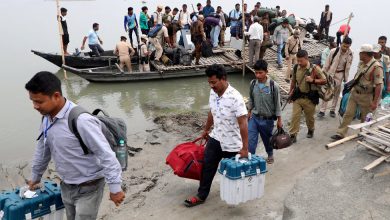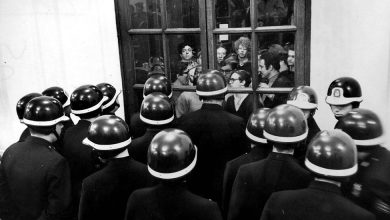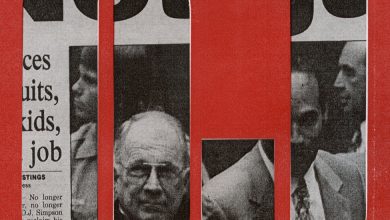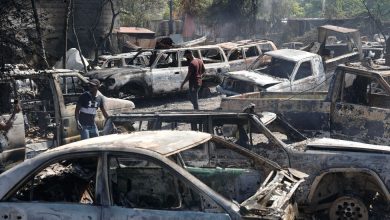When Books for Children Are Banned

More from our inbox:
- The Blame Goes Beyond Big Oil
- The Balance of Nature
- Our Visit to Bergdorf Goodman

Brooke Stephens, of Utah Parents United. The group lobbied for a bill banning “sensitive materials” in schools. Such measures have helped push books bans to record levels in the last two years.Credit…Niki Chan Wylie for The New York Times
To the Editor:
Re “Growing Network of Conservative Groups Is Fueling Book Bans” (front page, Dec. 13):
Do these parents really believe that the moral code they teach to their children is so fragile that the presence of a book on a library shelf will threaten it? Do they take no responsibility for talking with their children about the diversity of life and how their personal morals fit in?
A personal moral code is complex, and the most powerful influence is from the home. But even then no one can force anyone to believe something that does not fit their values or sense of self.
A book alone cannot force someone to behave in a manner that contradicts their morals. And banning books will not eliminate the ideas and voices of the people who wrote them. The ideas are out there in the conversations young people have every day.
The world is a diverse place. And eventually these “innocent children” will leave home and form their own moral code, sometimes despite what they may have been taught at home.
No one can protect their children from everything. And that is a good thing. Children need to be prepared to deal with a complicated world, and they can’t do that if they are shielded by fear and hate from ideas with which they disagree.
Jo Trafford
Portland, Maine
To the Editor:
As a young boy growing up in Los Angeles in the 1950s, I was fascinated by the New York gangsters I read about in a book called “Murder, Inc.” But my father, who had grown up in Brooklyn in the 1920s and had gone to school with some of the most infamous characters in the book, was not amused.
He made me return the book to the library. He did not, however, demand that the library get rid of the book, nor did he launch a campaign to ban all books about organized crime.
My father was exercising his parental rights, trying to protect his children from material he considered inappropriate. Activist groups like Florida Citizens Alliance are more interested in imposing their personal beliefs on other people’s children.
Their next step may well be into the grown-up world, attempting to ban all books that do not align with their strict agenda. It wouldn’t be the first time in history.
Bart Braverman
Indio, Calif.
To the Editor:
I was born in a country where state worship is the national sport, uniting left and right, government and opposition. And so it was eye-opening for me to discover, upon arriving in the U.S. 49 years ago, that the founding fathers took wide-ranging precautions to prevent the tyranny of the center, investing the periphery with unparalleled powers.
What they apparently did not anticipate, I am now discovering, is the tyranny of the periphery. The government’s power to decree what books students should and should not read in my native Turkey is replaced here with local yahoos decreeing what students should and should not read.
Add to that local boards’ capricious decisions not to certify elections, local legislatures’ power to gerrymander electoral districts, and the authority recently given to private individuals to discriminate against others based on their loosely defined “religious beliefs,” and I am beginning to wonder if this great bastion of democracy is anything but that!
Irvin Cemil Schick
Newton, Mass.
To the Editor:
I find it hard to take comments like “this is not about banning books, it’s about protecting the innocence of our children” seriously.
Our children learn shelter-in-place and active-shooter drills from kindergarten onward, and these same parents are not rallying around bans on assault rifles.
Allowing children to browse through the thousands of library books available and expand their minds does not destroy their innocence. Yet knowing that their school could be next, and that they could become the next victim, shatters not just innocence but lives as well.
These conservative groups are specifically targeting books by or about Black and L.G.B.T.Q. people. Calling it parental rights to shield their children is a poor excuse to hide their bigotry.
Pam Lotke
Takoma Park, Md.
To the Editor:
Let’s see what happens if we put the Bible on the list of what children cannot read. After all, it’s full of incest, infanticide, sodomy, murder and other violence.
Paul Wilks
Kansas City, Mo.
The Blame Goes Beyond Big Oil
To the Editor:
Re “Big Oil Companies Are Bullies That ‘Want to Be Seen as Good Guys,’” by David Wallace-Wells (Opinion, nytimes.com, Dec. 15):
Representative Ro Khanna of California’s comments about Big Oil’s role in prolonging the climate crisis are timely and necessary. These companies should be held accountable. But Congress’s approach is allowing a vast number of companies that use huge amounts of energy to pass the buck.
For the past 10 years, Big Oil has recognized the need for fundamental research and has provided significant funding to universities to develop radically new energy technologies. These efforts have often been criticized as greenwashing. But what have the other giants of American industry done? They have largely passed the buck, continue to do so and remain out of the line of sight of Congress.
When tech giants like Google, Apple, Amazon and Microsoft make net-zero promises, who are they expecting to create the necessary technologies? Just buying some carbon credits won’t cut it.
We need investment in clean energy research from the demand-side companies generating significant emissions from fossil fuels. To address the climate crisis, we need everybody at the table and held accountable, not just Big Oil.
Brian Korgel
Austin, Tex.
The writer is a professor of engineering at the University of Texas at Austin.
The Balance of Nature
To the Editor:
Re “It’s Time to Say ‘Put Down That Burger,’” by Michael Grunwald (Opinion guest essay, Dec. 18):
Putting down the burger is still dancing around the elephant in the room. Yes we need to eat less meat and return ranch land to nature. Yes we need to clean up our agricultural practices. And of course we should stop wasting food and clean our plates as baby boomer children were taught by Depression-era parents.
But once again there was no mention of why we need to produce so much food in the first place. We have produced too many people! We humans have exceeded our carrying capacity. We’ve unbalanced the balance of nature. And that appears to be the most uncomfortable topic of all.
Janice Petty
Tucson, Ariz.
Our Visit to Bergdorf Goodman
To the Editor:
Re “Surviving Bergdorf Goodman” (Thursday Styles, Dec. 15):
Years ago I took my 14-year-old son to a rally in Manhattan against the invasion of Iraq. It was a cold, wet day; we were soaked.
I come from western New York, where all the department stores have lunchrooms. I knew that Bergdorf Goodman must have one too, and I thought that this would be the perfect time for us to see the store I’d only heard about, as well as warm up with some hot chocolate.
At the entrance, the security guard warned us politely that we were not allowed to take our large political sign indoors, but if we liked he would hold it for us until we were finished with our snack. And he did.
Christine Contillo
Haworth, N.J.




